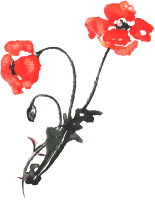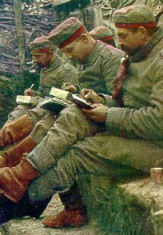Veldpost in W.O.I

After the questions you will find a list of statements. Do you agree with these statements? For each one, see what evidence is in the letter.
Liutenant Cecil Slack to Flossie and Dora, 150th. Brigade, 50th Division, B.E.F.
Dear Flossie and Dora,
I arrived here safely on Thursday evening. "Here" is 40 yds. from the Huns. There are about 15 of my old platoon left. We were very glad to see each other again. The enemy were very quiet the first night, probably having heard of my return, and feeling a bit awed thereat.
Yesterday our guns had a strafe for about 30 minutes, the Germans replying in a very meek and mild fashion. It is very muddy and wet, and quite cold at nights. Rats swarm, they come and give one the glad eye when resting in a dugout, and run across one at nighttime. They feed on bacon scraps and dead men.
We have spells of 4 days in the trenches, 4 days in the reserve, 4 days in the trenches again, and then 4 days rest. There is nothing to do except keep the trenches tidy, and inspect rifles and gas helmets. Every morning everyone has to remove his gum boots and socks and rub his feet, otherwise "trench foot" is contracted, and the toes and feet drop off.
I had a couple of shots this morning at what I thought was a German. I don't know whether I killed anything, but I tried hard. We are not allowed to speak to the people across the way, but they have recently informed us that the war will be over in one month's time.
Yesterday we had bacon and eggs for breakfast, a luxury which I had not expected. We have roast beef for dinner. The joint is passed round and each cuts a chunk off. The same knife is used for butter, meat, jam, bread and cheese, and for stirring the tea!
Our tea is made from water pumped from the ground. You know it is tea, because of the tealeaves. Shaving water comes from the same source, and you know it isn't tea because there are no tea-leaves.
I met an old schoolfellow on the boat from Southampton. G.N.Smith is his name. I think he had a sister at Penrhos. A piece of shell from one of our guns fell within 3 yards of me yesterday, and quite startled me for the moment. There is a rumour here today that 3 divisions of Huns have been cut off by the French. An unexploded shell has this moment dropped outside our dugout. We are feeling quite pleased.
Kindest regards to your Father and Mother,
Yours sincerely,
Cecil
Vragen over de brief
- Gebruik elementen (bewijs) uit de brief in je antwoord.
- Wanneer is deze brief geschreven?
- Waar gaat de brief over?
- Wie is de schrijver van de brief en aan wie schrift de auteur? Wat is hun relatie?
- Waarom schrijft de auteur van de brief over juist deze dingen?
- Waarover verbaas je je en waarom?
Uitspraken over de oorlog
Bepaal voor elke uitspraak of je er in de brief aanwijzingen/bewijsmateriaal in vindt. Een yard is iets minder dan een meter; de soldaten konden met hun geweren zo'n 700-800 meter schieten en waren over een afstyand van honderden meters nog nauwkeurig.
- Few soldiers died in the war.
- The British and German front lines were very far apart.
- Soldiers did not lose their sense of humour.
- Life in the trenches was hard for soldiers.
- Standards of hygiene (keeping clean and free of germs) were very good.
- The soldiers enjoyed their food.
- The soldiers had excellent clothing to keep warm and dry.
- British soldiers liked the Germans very much.
- British soldiers spent all their time fighting the Germans.
- The soldiers knew when the war was going to end.
- British soldiers all had beards.
- The British were on the same side as the French.
- Trenches were clean, dry and comfortable.
- Soldiers were very safe in the trenches.
